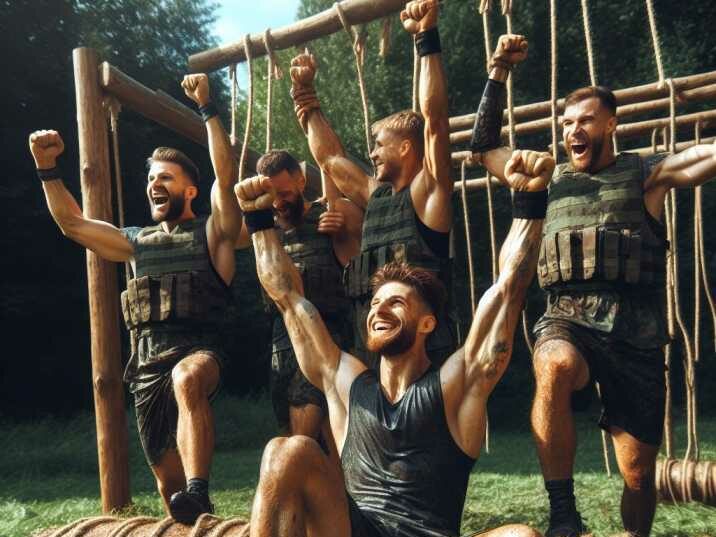Mental resilience 7 obstacle course
Table of Contents
Introduction:
In the fast-paced and demanding world we live in, mental toughness has become a key factor in achieving success and overcoming life’s challenges. One effective way to build mental resilience is through obstacle course workouts, a unique and engaging form of training that goes beyond physical strength. In this article, we’ll explore the concept of mental toughness, the benefits of obstacle course workouts, and how you can incorporate them into your fitness routine for a stronger mind and body.
Understanding Mental Toughness:
Mental toughness is the ability to persevere and remain focused in the face of adversity. It involves staying resilient, managing stress, and bouncing back from setbacks. Building mental toughness is crucial for achieving personal and professional goals, as it empowers individuals to navigate life’s obstacles with a positive mindset.
Obstacle Course Workouts: A Holistic Approach to Fitness:
Obstacle course workouts are more than just physical challenges; they provide a holistic approach to fitness by combining strength, endurance, agility, and mental acuity. Traditional workouts often focus solely on physical conditioning, but obstacle courses require participants to think on their feet, problem-solve, and maintain composure under pressure.

Benefits of Obstacle Course Workouts for Mental Toughness:
- Adaptability: Obstacle courses are unpredictable, requiring participants to adapt quickly to changing scenarios. This adaptability translates directly into everyday life, helping individuals navigate unexpected challenges with ease.
- Resilience: Overcoming obstacles, whether physical or mental, builds resilience. Each conquered challenge reinforces the idea that setbacks are temporary, fostering a resilient mindset that can be applied to various aspects of life.
- Stress Management: Navigating through an obstacle course can be stressful, simulating real-life stressors. Learning to manage stress in a controlled environment prepares individuals to handle high-pressure situations in their personal and professional lives.
- Improved Focus: Obstacle course workouts demand intense concentration. Negotiating obstacles successfully requires mental focus, promoting improved attention and concentration in other areas of life.
- Teamwork and Communication: Many obstacle courses are designed for group participation, fostering teamwork and communication skills. Collaborating with others to overcome challenges enhances social intelligence and strengthens interpersonal relationships.

Incorporating Mental Toughness Training into Your Routine:
- Start Small: If you’re new to obstacle course workouts, begin with simpler challenges and gradually increase the difficulty. This gradual progression allows your mind and body to adapt, preventing overwhelm.
- Consistency is Key: Like any form of training, consistency is crucial. Regular participation in obstacle course workouts will not only improve your physical fitness but also contribute to the development of mental toughness over time.
- Set Realistic Goals: Establish clear and achievable goals for your mental toughness journey. Whether it’s conquering a specific obstacle or completing a course within a certain time frame, setting realistic goals will keep you motivated.
- Embrace Failure: Failure is an inherent part of any obstacle course. Instead of seeing failure as a setback, view it as an opportunity to learn and grow. Embracing failure builds resilience and strengthens your ability to overcome challenges.
Conclusion:
In a world where mental toughness is a prized attribute, obstacle course workouts offer a unique and effective way to build resilience, adaptability, and a positive mindset. By incorporating these challenging yet rewarding workouts into your fitness routine, you not only enhance your physical strength but also develop the mental fortitude needed to tackle life’s obstacles head-on. Embrace the journey of mental toughness training through obstacle course workouts, and unlock the full potential of your mind and body.

Frequently Asked Questions (FAQs)
Q1: What is mental toughness, and why is it important?
A1: Mental toughness is the ability to persevere and remain focused in the face of adversity. It’s crucial for achieving personal and professional goals, empowering individuals to navigate life’s challenges with resilience and a positive mindset.
Q2: How do obstacle course workouts contribute to mental toughness?
A2: Obstacle course workouts provide a holistic approach to fitness by combining physical challenges with mental acuity. Negotiating obstacles requires adaptability, resilience, stress management, improved focus, and often involves teamwork – all of which contribute to the development of mental toughness.
Q3: Are obstacle course workouts suitable for beginners?
A3: Yes, absolutely. It’s advisable for beginners to start with simpler challenges and gradually progress to more complex ones. This gradual approach allows for the adaptation of both the body and mind to the demands of obstacle course training.
Q4: Can obstacle course workouts be done alone, or are they better suited for group settings?
A4: Obstacle course workouts can be tailored to individual preferences. While some courses are designed for group participation, there are also solo obstacle courses available. Both settings offer unique benefits – group participation enhances teamwork and communication skills, while solo courses provide an individualized challenge.
Q5: How can one incorporate mental toughness training into their existing fitness routine?
A5: To incorporate mental toughness training, start by integrating simpler obstacle course elements into your routine. Consistency is key – regular participation will contribute to both physical and mental development. Set realistic goals, embrace failure as a learning opportunity, and gradually increase the difficulty of the challenges.
Q6: Are there any age or fitness level restrictions for obstacle course workouts?
A6: Obstacle courses can be adapted to different fitness levels and ages. Many courses offer varying difficulty levels for participants to choose from. However, it’s advisable to consult with a fitness professional or healthcare provider to ensure that obstacle course training is suitable for individual circumstances.
Q7: Can obstacle course workouts be done indoors, or do they require special facilities?
A7: While traditional obstacle courses are often outdoors, there are indoor variations and gym-based obstacle courses available. The key is to find a setting that aligns with your preferences and fitness goals. Indoor courses are particularly suitable for those who prefer a controlled environment.
Q8: How long does it take to see the benefits of mental toughness training through obstacle course workouts?
A8: The timeline varies from person to person. Consistent participation over time will yield both physical and mental benefits. It’s essential to be patient and focus on the journey, celebrating small victories along the way.
Q9: Can obstacle course workouts help with stress management in everyday life?
A9: Yes, obstacle course workouts simulate real-life stressors, providing a controlled environment to practice stress management. Overcoming obstacles in a workout setting can enhance your ability to handle high-pressure situations in various aspects of life.
Q10: Are there specific mental techniques to complement obstacle course training for maximum benefit?
A10: Yes, incorporating mindfulness, visualization, and positive self-talk can enhance the mental benefits of obstacle course training. These techniques can help maintain focus, manage stress, and foster a positive mindset during challenging workouts.


